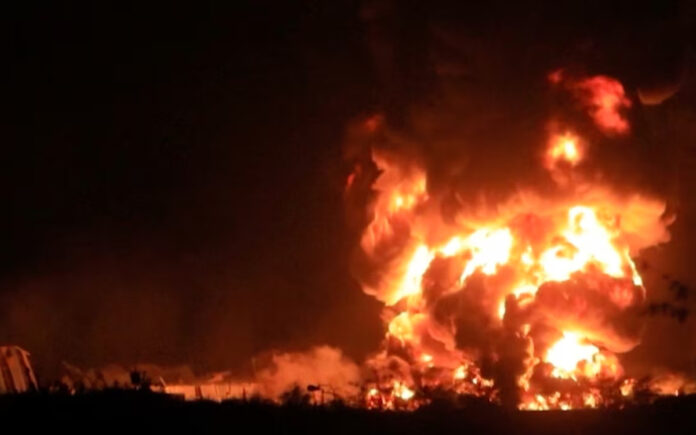Sanaa: Israel launched a wave of airstrikes on Yemen’s Hodeidah Port on Monday, targeting what it described as “Houthi terrorist infrastructure,” in response to a missile attack the previous day that landed near Israel’s main airport.
“The attack was carried out in response to repeated attacks carried out by the Houthi terrorist regime against the State of Israel in which surface-to-surface missiles and unmanned aircraft were launched at the territory of the state and its citizens,” the Israeli military said in a statement.
The Israeli strikes, which reportedly targeted areas in and around the port city of Hodeidah, killed at least one person and injured 35 others, according to Yemen’s Houthi-run Saba news agency, citing the local health ministry.
Sources in the area said the Houthis shut down access to the port and a nearby cement factory following the bombardment. While the full extent of the damage remains unclear, multiple sources reported heavy damage to the container terminal, with some estimating that nearly 70% of the port’s five docks, warehouses, and customs facilities were affected. A worker at the port added that the strikes hit while two ships were unloading, bringing port operations to a complete halt.
Hodeidah, the second-largest port on the Red Sea after Aden, is a vital entry point for Yemen’s imports, handling around 80% of the country’s food supplies. The Israeli offensive reportedly included over 10 airstrikes on the port as well as nearby neighborhoods such as Al Salakhanah and Al Hawak, according to five local residents. Additional strikes targeted a cement factory east of the city.
The strike followed the first known successful Houthi missile attack on Israeli territory that evaded interception, prompting Israeli Prime Minister Benjamin Netanyahu to vow retaliation.
Reacting to the Israeli airstrikes, senior Houthi official Abdul Qader al-Mortada warned in a post on X that Israel should prepare for the “unimaginable.”
The Houthis resumed attacks on Israeli territory and Red Sea shipping lanes shortly after the collapse of a temporary ceasefire between Hamas and Israel in Gaza. Claiming to act in solidarity with Palestinians, the Iran-aligned group has escalated its regional campaign since the Gaza war began.
A U.S. official, speaking anonymously, confirmed that while American forces were not directly involved in Monday’s Israeli airstrikes, there is “general coordination” between the two allies.
Also Read | LoC Tensions Soar as Pakistan Violates Ceasefire Again
Meanwhile, the Houthi-controlled Yemen Oil Company announced it has activated an emergency fuel distribution system for vehicles due to complications in unloading oil shipments at the Ras Isa terminal. The company blamed these disruptions on ongoing U.S. strikes in the region.
U.S. President Donald Trump, in March, authorized broad military action against the Houthis, resulting in hundreds of casualties. While the U.S. has maintained an aggressive stance, Israel had limited its operations in Yemen until now, with the latest strike marking a significant escalation.
Also Read | Kashmir’s Tourism Grinds to a Halt as India-Pakistan Tensions Escalate
In a related development, the Israeli government approved a controversial plan on Monday that may include seizing Gaza and controlling humanitarian aid to the Palestinian enclave.
The conflict traces back to October 7, 2023, when Hamas launched deadly cross-border attacks that killed 1,200 people and took 251 hostages, according to Israeli figures. In response, Israel’s military campaign has devastated Gaza, with more than 52,000 Palestinians killed and widespread destruction reported, according to Gaza’s health officials.



